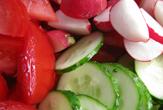Frozen Foods: Cheaper and Just as Nutritious

The United States Department of Agriculture is forecasting increases in grocery store prices this year, and fresh vegetable prices are already up nearly 10 percent from this time last year.
While some consumers will eat the costs, others may seek alternatives to fresh produce — which may not be a bad option, considering many frozen and canned vegetables are equally as nutritious as fresh, said American Dietetic Association spokeswoman Keri Gans, author of "The Small Change Diet" (Simon & Schuster, 2011).
Canned and frozen foods often get a bad rap because it's engrained in people's minds that fresh is better, but the nutritional benefits are about the same because the foods are packaged at their peak ripeness, said Gans, a registered dietitian.
Plus, "if you keep frozen vegetables in the house, you don’t ever have to worry that you'll be caught without a vegetable, and you can stock up on them," Gans told MyHealthNewsDaily.
Just the vegetables
The key to buying frozen vegetables is to pick ones that don't come with an added sauce, Gans said. Many of the sauces are cheesy and creamy and loaded with extra calories, she said.
"If you need pizzazz for your vegetables, don’t look for it in the frozen food area," Gans said. "Look for it where you can add it on your own." You can buy the plain frozen vegetables, then add your own parmesan or spices after steaming or microwaving the vegetables, she said.
Get the world’s most fascinating discoveries delivered straight to your inbox.
Frozen fruits, like frozen raspberries, are good for thawing and throwing on cereal and yogurt, she added.
For canned vegetables, it's important to buy only the ones that have little or no added salt, Gans said.
Similarly, when buying canned fruit, watch out for added sugar, Gans said. Buy only canned fruit that has been packed in its own juices, and not fruit that is swimming in sugary syrup.
Ripeness and nutrition
Because fruits and vegetables are usually frozen or canned right at their peak ripeness, people shouldn't be concerned that they don't contain as many nutrients as fresh produce, Gans said. And "believe it or not, people eat fruits and vegetables that are not as nutritious as frozen because either they're no longer fresh or they're underripe," she said. "So sometimes the frozen can outweigh the fresh."
She added: "If you're going to say, 'If I can't get fresh, I'm not going to eat them,' I think that's a poor excuse, and I encourage consumers to rethink that notion. People should feel comfortable that if they're buying frozen fruits and vegetables, as long as there's no added fats and sugars, they're providing adequate nutrition for their families."
Pass it on: With the cost of fresh produce rising, consumers should know that canned and frozen fruits and veggies can be just as nutritious as fresh, so long as they don't come with added salt, sugar or creamy sauces.
Follow MyHealthNewsDaily staff writer Amanda Chan on Twitter @AmandaLChan.
This story was provided by MyHealthNewsDaily, a sister site to LiveScience.
 Live Science Plus
Live Science Plus






